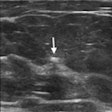
New guidelines for interventional oncology will increase research on image-guided procedures and standardize patient care, according to a report published September 28 in Radiology.
The guidelines were crafted by a 62-member expert panel that developed recommendations on how to "uniformly collect, analyze, and report outcomes for patients treated with image-guided tumor ablation," the RSNA said – and the guidelines are particularly useful as the field of interventional oncology continues to grow.
"Interventional oncology is a fast-growing offshoot of interventional radiology in which treatment is applied directly to the tumor through a catheter," the society said. "Compared with conventional treatments like surgery and chemotherapy, these minimally invasive image-guided procedures have lower complication rates, superior toxicity profiles and often comparable or superior outcomes."
A key recommendation from the guidance is that outcomes from image-guided procedures "should be analyzed and reported per patient and per tumor," wrote a team led by Dr. Robbert Puijk of Amsterdam University Medical Centers in the Netherlands. "This is because multiple index tumors within one unique patient, such as multiple liver metastases from colorectal cancer, are often treated simultaneously and cannot be regarded as independent."
The guidelines will benefit this emerging field, Puijk said in the RSNA statement.
"The given definitions in these current guidelines will provide the necessary foundation for scientific reproducibility between interventional oncology studies as they will ensure an objective and reliable interpretation of study outcomes, allow for accurate comparisons of results and avoid misinterpretations," he said.




















